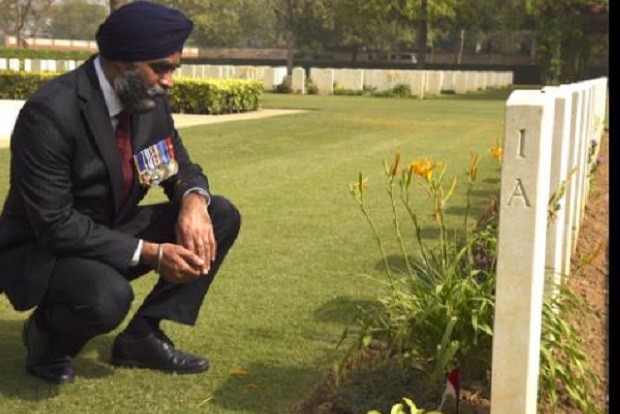On his first visit to India as Canada’s defence minister, Harjit Sajjan spoke about modern peacekeeping and security cooperation. But before he even landed in the country he was already facing criticism from a high-ranking official from the Indian state from which the defence chief was born.
Last Wednesday, Captain Amarinder Singh, chief minister of the state of Punjab linked Sajjan and other Canadian Members of Parliament and Members of Provincial Parliament a Sikh separatist movement. In an interview with the NDTV Indian television show Off the Cuff, Singh said he would not meet with Sajjan when he visits Punjab this week.
Delivered a speech to India's Observer Research Foundation @orfonline. Read along: @CanadainIndia ???????????????? https://t.co/7pchdgOQ8m pic.twitter.com/I2E1TWcnN3
— Harjit Sajjan (@HarjitSajjan) April 18, 2017
“I’ll tell you on a matter of principle, I don’t agree on this,” Singh said. “There are five ministers [in Canada] who are Khalistanis, and I am not interested in meeting any Khalistanis.”
Members of the nationalist movement Khalistan seek to create a separatist Sikh state. Political and armed conflict between the government and the movement flared up in Punjab in the 1970s and 1980s.
For more about Khalistan and Singh’s comments click on this link to a recent Maclean’s article.
Sajjan has refused to get caught up in the controversy.
He called the allegations against him “incorrect and unfortunate.”
“I don’t promote the break-up of any country. My job is to promote the bilateral relations,” Sajjan said in an interview with the Hindustan Times when he arrived in New Delhi.
Here’s what Sajjan said in his speech regarding other matters:
Modern Peacekeeping
But the peacekeeping of yesterday no longer reflects the changing nature of conflicts today. Today’s missions are often undertaken where there is no peace to keep.
These missions are more about peace support and the protection of civilians than they are about traditional peacekeeping.
Modern peace support operations take place in complex and hostile environments where belligerents are often not identified, civilians are being targeted, and arms, drugs, and people are being trafficked.
During his visit to #India, MND Sajjan lays a wreath at the Commonwealth War Cemetery in #Delhi where 18 Canadians are buried. pic.twitter.com/nRKRKdaWGW
— NationalDefence (@NationalDefence) April 18, 2017
It is no secret that peace missions are under strain. Nor is it surprising that the UN has requested that countries with advanced militaries play a larger role.
In Canada, we understand that evolving conflicts abroad have a very real impact on our national security and Canadian interests. Many other countries do as well.
…“We cannot be an island of instability in an ocean of turmoil.”
Innovative approaches
In terms of innovative approaches, let me reiterate that the military alone will not be able to deliver security and restore countries to a peaceful state.
I firmly believe that NGOs, international organizations and the business community are doing very important work in conflict zones. We can learn from their experiences and perspectives.
I also feel strongly that we need to empower women in conflict and involve them in decision-making in security matters. I know this is an area where India excels.
I applaud you for deploying the first unit composed entirely of female police officers in the UN to Liberia.
We also need to support younger generations in their education and eventually, in their gainful employment. This is particularly the case in Africa, where close to 60% of the population is 25 years old or less.
By working to address the root causes of conflict…by engaging other nations to work with us…and by supporting initiatives ranging from training to humanitarian assistance, development, and education…we can maximize our contributions and increase our chances of success.
All of these things are needed today to achieve international peace and prosperity.
Since forming the government, Prime Minister Trudeau has committed Canada to multilateralism more strongly than we have in many years.
We have pledged troops and have launched our new Peace and Stabilization Operations Program, worth $450 million dollars.
Our commitment also includes an increase of up to 150 police officers deployed to support UN peace operations.
And our commitment doesn’t end there. Canada will be hosting the UN Peacekeeping Defence Ministerial meeting later this year.
Canada has not only contributed to peace operations.
We had many hard-fought battles in Afghanistan.
And Canada continues to make valuable contributions to several international missions right now, including in Iraq, Ukraine and soon in Latvia.
In addition, Canada has been involved in the counter-ISIL core group where we continue to make significant contributions and have evolved our approach from a strategic military one to a more comprehensive approach.
Defence Policy Review
Let me say a few words about Canada’s efforts to renew its defence policy.
Our government has been engaged in some deep thinking about our priorities and objectives over the past year.
We recently undertook a comprehensive review of our defence policy to address emerging peace and security challenges.
The review was rigorous and evidenced-based, involving unprecedented consultations with Canadians, academia and experts, Parliament, and our allies. Consultations of this magnitude have not taken place since the 1990s.
This process explored three key topics. The first was to examine the main challenges to Canada’s security.
The second assessed the Canadian Armed Forces’ role in addressing threats and challenges, now and into the future.
The third area looked at what resources and capabilities would be required to effectively tackle these challenges.
The input we received from consultations and our analysis of these key questions has informed a new policy approach that reflects the vision Canadians have for our country and where it is headed in the coming years.
A policy that responds effectively to both the challenges and opportunities inherent in the world now, and into the future.
I am in the process of finalizing Canada’s new defence policy, which I will soon be releasing.

